Devolution and Local Government Reorganisation
“As we submit these business cases for the future of local government in Kent and Medway, our focus remains firmly on delivering high-quality, efficient services that truly meet the needs of our residents.
“This is the most significant change to local councils in half a century, and while the exact shape of the new unitary councils is still to be determined, we are committed to working collaboratively with our partners and the community to ensure the best possible outcomes for Ashford and the wider region.
“We know from recent engagement that people want clarity, value for money, and services that solve problems quickly. That’s why, as we move through this process, we will continue to listen, to inform, and to put residents at the heart of every decision.
"There is much work ahead, but I am confident that, together, we can shape a future local government that is responsive, resilient, and ready to meet the challenges and opportunities ahead.”
Cllr Noel Ovenden, Leader of Ashford Borough Council

Change is Coming campaign
Government ministers want councils like yours in Kent and Medway to deliver the services they provide in a different way.
In the biggest shake up of local government in almost 50 years, they want to merge councils across the historic county of Kent to create a number of unitary councils serving roughly 500,000 people each.
This is known as Local Government Reorganisation or LGR for short.
Under the current system Kent County Council (KCC) delivers some services like education, social services and roads, and district or borough councils deliver others like emptying your bins and providing housing services.
In the proposed system, unitary councils would deliver all council services in one area. Medway Council operates in that way today.
This Local Government Organisation presentation on our website provides a summary on the LGR process and below you can find the latest updates.

Latest updates
In November 2025, Councils from across Kent and Medway published a series of draft business cases to help inform the next steps in the government’s biggest shake up of local councils in 50 years.
The cases, compiled with the help of experienced advisers KPMG, explore different options for the number of unitary councils across Kent and the areas they should cover in the future.
In September, councils chose two options to explore in more detail using government money.
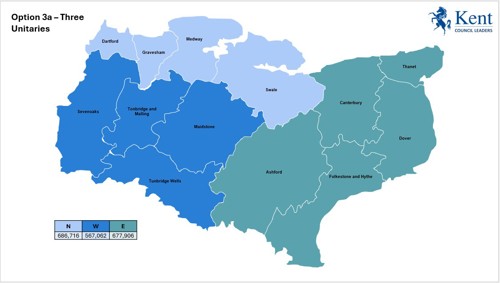
The first was three unitary councils consisting of Dartford, Gravesham, Medway and Swale in the north; Sevenoaks, Tonbridge and Malling, Maidstone and Tunbridge Wells in the west and Ashford, Canterbury, Thanet, Dover and Folkestone and Hythe in the east.
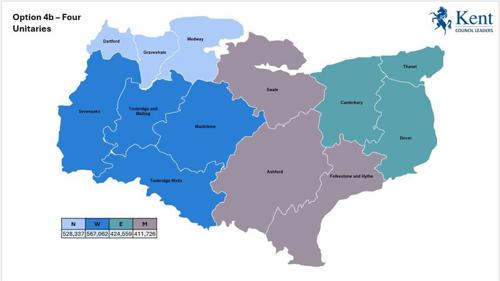
The next was four unitary councils consisting of Dartford, Gravesham and Medway in the north; Sevenoaks, Tonbridge and Malling, Maidstone and Tunbridge Wells in the west; Swale, Ashford and Folkestone and Hythe in the middle of Kent and Canterbury, Thanet and Dover in the east.
Councils across Kent kept the option to pay for and submit business plans for alternative options themselves using the KPMG data.
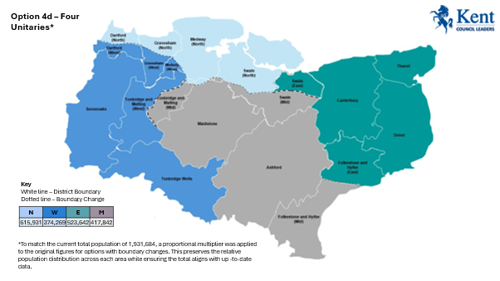
Medway Council is proposing a four-unitary model with changes to existing council boundaries.
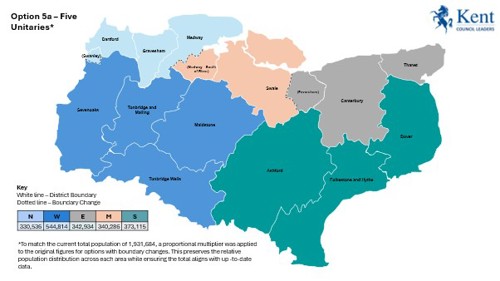
Gravesham Borough Council and Dartford Borough Council have developed proposals for a five-unitary model also including a number of boundary changes.
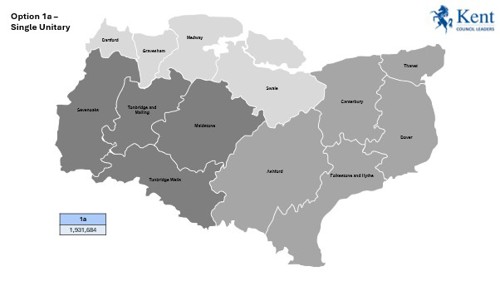
KCC announced its intention to explore the case for a single unitary council covering Kent and Medway supplemented with three area committees covering the north, east and west of the county.
Next steps
During November, councillors across the Kent and Medway met to decide their preference on the above options. Each individual council used its own decision-making process to confirm its preferred model and associated business case.
In Ashford, an Extraordinary Full Council meeting was held on 27 November to debate the subject before Cabinet made their decision the same evening. Cabinet decided to back option 4d.
It was felt the 4d model goes a step further than the other business cases on the basis that minor boundary changes are acceptable, making this is a once in a life time opportunity to remodel the geographical areas that make sense of the developed communities of Kent reflecting their local identities, creating a sense of place, travel to work opportunities, balancing urban and rural across a four unitary model with strategic capacity.
The final decision our how the new councils in Kent and Medway will look rests with ministers. In the Spring this year, the government is expected to carry out public consultation with all Kent residents on the preferred options. A decision by the government on the final structure of unitary councils is then expected in the summer.
Initial public feedback
Meanwhile, the results of a public and stakeholder engagement exercise held to find out from people living, working and studying in Kent about what is important to them in reorganising councils has been published.
It found the public wants the new arrangements to focus on the quality of the services provided, ensure efficiency and value for money and to solve people’s problems quickly.
The public saw opportunities in simplifying local government structures, clarifying responsibilities and making the most of economies of scale to streamline operations, reduce bureaucracy and deliver better value.
You can read the results of the Public Survey Report on the Kent Council Leaders website.
What is devolution?
Devolution is all about having a new tier of government allowing strategic decisions that affect local people in Kent, which will be made by the new authority, run by an elected Kent mayor.
These strategic decisions are on those contentious issues around roads, transport, education, health, planning - all done currently in Westminster - but will be moved to a local Kent and Medway wide Mayoral authority.
How will it work?
It means the transfer of powers from Westminster to Kent along with funding to deliver those strategic decisions. These structures already exist around the country in city regions like Manchester and Birmingham, and more recently in places like the West of England, and Cambridgeshire and Peterborough.
What is the difference between devolution and LGR?
Devolution is the transfer of powers and funding from national to local government. Local government reorganisation is about how the powers and funding that sit with local government are organised between councils.
ABC priorities remain the same
While we work our way through this process, for the near future at least, nothing changes in terms of the services we delivery to you.
Ashford Borough Council officers and councillors will continue to focus on our priorities set out in the Borough Plan and progressing on important work like a new Local Plan, delivering affordable housing for local people and serving our residents.
Local Government Association explainer video
For further information
Government devolution page.
English Devolution White Paper.
Local Government Association devolution hub.
National Association of Local Council's briefing on the English Devolution and Community Empowerment Bill.






